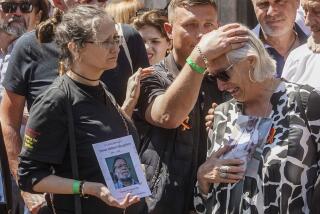Petition Reopens Wound in French Blood Scandal : Health: Letter seeks pardon for two doctors who were jailed for giving AIDS-tainted products to hemophiliacs.
- Share via
PARIS — More than a year after two French doctors were sent to prison for knowingly giving AIDS-infected blood products to hemophiliacs, the debate over the scandal was reignited this week by a petition from 98 doctors and scientists worldwide seeking a pardon for the prisoners.
The letter to President Francois Mitterrand, the first such appeal since the 1992 verdict in the blood scandal, was sharply criticized Friday by other doctors, AIDS activist groups, the families of 300 hemophiliacs who have died of AIDS and 900 more who are known to be infected.
“To make this demand while the victims of this tragedy are dying is showing unbelievable indecency,” said Dr. Jacques Leibowitch, an immunologist and head of the Raymond-Poincare Hospital outside Paris. “It is also a sort of confession. Those who signed are saying, ‘We didn’t act so differently in 1985.’ ”
The French branch of ACT UP, an AIDS activist group based in New York, described the petition, signed Wednesday by doctors and researchers from nine countries including the United States, an “undignified plea.” And it blamed the “corporate reflex” of doctors for the appeal.
The mood was summed up by an editorial cartoon on the front page of the influential daily Le Monde on Friday. It showed a smiling doctor asking a patient on life-support systems to sign the petition. Receiving no reply, the doctor promises: “I’ll come back later. . . .”
Indeed, in making their appeal to Mitterrand, the signatories seemed especially concerned with the precedent that the case had set as a threat to medical progress.
Although they expressed “solidarity and compassion” for the hemophiliacs, the signatories said, “It is our duty to guard against any unjustified sentiment of mistrust against doctors and medical science.”
The petition said the verdicts had been “an unprecedented ‘trial by media’ (in which) sensationalism dominated to the detriment of accuracy.” And it expressed concern that “the fear of legal reprisals could divert doctors and scientists from assuming their duties.”
Dr. Gille-Patrice Cassuto, head of the hematology department at the University Hospital Centre in Amiens, said that when he was asked to sign the petition, “I didn’t think for one moment of doing it. And the way this is going to be seen is that again, as always, the doctors are on one side and society is on the other.”
What most doctors and even the victims of the scandal do agree on is that high government officials, protected from ordinary justice by government immunity as members of Parliament, should also have been accused in the case.
And, in fact, the law protecting them changed just days ago. Under the new law, a special 15-member “court of justice” has been set up to handle charges made against government officials.
Max Lecoq, a lawyer representing 19-year-old Ludovic Bouchet, who was infected with the HIV virus via blood products, filed suit Thursday against Laurent Fabius, who was prime minister at the time, and two of his government ministers. Lecoq’s suit accuses the trio of delaying the introduction of the American blood-screening test for months until French researchers could develop their own test. He also has accused them of “poisoning” his client.
The principal defendant in the original case was Michel Garretta, former director of the country’s blood bank, who was sentenced to four years in prison. Dr. Jean-Pierre Allain, chief researcher for the National Center for Blood Transfusion, was given a two-year sentence. A third doctor received a suspended sentence.
Both men already have served more than a year of their sentences, and they are both likely to walk free long before their colleagues’ appeal for a pardon wends its way through the government bureaucracy, a Mitterrand spokesman said. Garretta is eligible for parole this summer, and lawyers said that Allain could go free earlier.
An appeals court last July, in upholding the convictions, said Garretta had, in 1985, continued to supply contaminated blood products to French hemophiliacs at least six months after an American blood-screening test and heat-treatment process, which prevents contamination, were perfected and being used in other countries.
Garretta, 49, admitted in his testimony that he had made serious errors. “Today, it’s clear. It was a mistake.” But, in his defense, he said everybody in the French government “knew about it, including me.”
More to Read
Sign up for Essential California
The most important California stories and recommendations in your inbox every morning.
You may occasionally receive promotional content from the Los Angeles Times.













